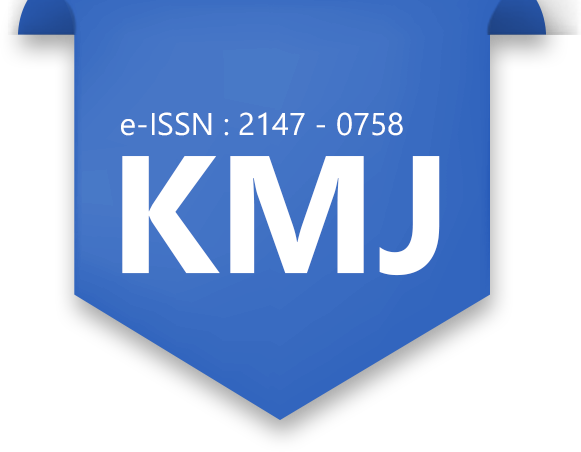
Induction Deaths and Treatment-Related Mortality in Childhood Acute Lymphoblastic Leukemia with ALL-BFM Protocols
Duygu Köse, Nazan Sarper, Emine Zengin, Sema Aylan GelenDepartment Of Pediatrics Of Kocaeli Medical Faculty, Kocaeli University, Kocaeli, TurkeyINTRODUCTION: Favorable results were achieved in childhood acute lymphoplastic leukemia (ALL) by Berlin-Frankfurt-Münster (BFM) study group trials. Here, biological features of leukemia and treatment results of children and adolescents treated with BFM-based protocols were analysed to explain relatively inferior outcomes compared to BFM-ALL study group
METHODS: Data of the patients diagnosed between January 2001-December 2014 were collected from hospital records. BFM- Turkey ALL 2000 (TRALL-2000) (modified BFM-95), BFM-ALL 95 and BFM-ALL-Intercontinental -2009 treatment protocols were used consecutively. All patients 1-18 year-old, excluding patients with Down syndrome were included in the study.
RESULTS: There were 207 patients with a mean age of 6.64 ± 4.35 years. Distribution of the patients were 27.5%, 54.9% and 16.2% in standard, medium and high risk groups, respectively. Immunophenotype was B-ALL, T-ALL and biphenotypic leukemia in 84.3%, 13.7% and 1% of the patients respectively. There were 9 (4.3%) induction deaths and remission rate was 94.2% on day 33. Thirteen patients (6.5%) died in the first complete remission. Sixteen of the deaths (7.7%) in induction plus first complete remission were infection related. Relapse rate was 19.3%. Mortality was 20.1%. Seven-year event free survival and overall survival were 73% and %79.4 respectively.
DISCUSSION AND CONCLUSION: Compared to multicenter trial BFM-95 of BFM-ALL study group, induction deaths and death in first CR were high. Survival rates were similar to other Centers of Turkey. Improvement in conditions of the Hematology Units, better supportive care, training of the staff and caregivers will be required to decrease infection related mortality.
Keywords: Acute lymphoblastic leukemia, children, induction deaths, treatment- related- mortality, event-free-survival, overall survival
Çocukluk Çağı Akut Lenfoblastik Lösemilerinde, ALL-BFM Protokolleri ile İnduksiyon Ölümleri ve Tedavi-İlişkili Ölümler
Duygu Köse, Nazan Sarper, Emine Zengin, Sema Aylan GelenKocaeli Üniversitesi Tıp Fakültesi, Çocuk Sağlığı ve Hastalıkları Anabilim Dalı, Kocaeli,TürkiyeGİRİŞ ve AMAÇ: Çocukluk çağı akut lenfoblastik lösemilerinde (ALL), Berlin-Frankfurt-Münster (BFM) çalışma grubu çok iyi sonuçlar elde edilmiştir. Burada, BFM-ALL çalışma grubuna göre daha kötü sonuçlar alınmasının nedenlerinin açıklanması için lösemilerin biyolojik özellikleri ve BFM tabanlı protokollerle tedavi edilmiş çocuk ve ergenlerin tedavi sonuçları değerlendirilmiştir.
YÖNTEM ve GEREÇLER: Ocak 2001-Aralık 2014 döneminde tanı konmuş hastaların bilgileri hastane kayıtlarından alındı. BFM- Türkiye ALL 2000 (TRALL-2000) (BFM-ALL 95 ten türetilmiş), BFM-ALL 95 ve BFM-ALL-Intercontinental-2009 tedavi protokolleri art arda kullanıldı. Down sendromlu hastalar dışındaki 1-18 yaştaki tüm hastalar çalışmaya alındı.
BULGULAR: Ortalama yaşı 6,64 ± 4,35 yıl olan 2017 hasta vardı. Hastaların standart, orta ve yüksek risk grubundaki dağılımları sırasıyla %27,5, %54,9 ve %16,2 idi. İmmünofenotip sırasıyla hastaların %84,3, %13,7 ve %1,0 inde B-ALL, T-ALL ve bifenotipik lösemiydi. İndüksiyon ölümü 9 hastada (%4,3) saptandı ve 33. günde remisyon oranı %94,2 idi. On üç hasta (%6,5) ilk tam remisyonda kaybedildi. İndüksiyon+ tam remisyondaki ölümlerin 16 sı (%7,7) enfeksiyonla ilişkiliydi. Relaps oranı %19,3 tü. Ölüm oranı %20,1 idi. Yedi-yıllık olaysız sağkalım ve genel sağkalım sırasıyla %73,0 ve %79,4 idi.
TARTIŞMA ve SONUÇ: BFM-ALL çalışma grubunun BFM-ALL 95 çalışmasına kıyasla, bu çalışmada indüksiyon ölümleri ve ilk remisyondaki ölümler daha yüksekti. Sağkalım oranları Türkiye'deki benzer merkezler gibiydi. Enfeksiyonlara bağlı ölümlerin azaltılması için, hematoloji ünitelerinin şartlarının iyileştirilmesi, daha iyi destek bakım, çalışanların ve refakatçilerin eğitilmesi gerekmektedir.
Anahtar Kelimeler: Akut lenfoblastik lösemi, çocuklar, indüksiyon ölümleri, tedavi ilişkili ölümler, olaysız sağkalım, genel sağkalım
Manuscript Language: English












